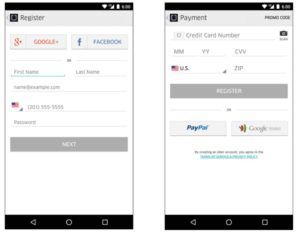In recent years, courts have issued varying rulings as to whether online or mobile users adequately consented to user agreements or terms of service when completing an online purchase or registering for a service. In each case, judges have examined the facts closely, particularly the user interface that presents the terms to the user before he or she completes a transaction. In an important ruling vindicating Uber's user registration and electronic contracting process, the Second Circuit reversed the lower court and held that the notice of Uber's terms of service was reasonably conspicuous and that the plaintiff unambiguously manifested assent to the terms, and therefore agreed to arbitrate his claims with Uber. (Meyer v. Uber Technologies, Inc., 2017 WL 3526682 (2d Cir. Aug. 17, 2017)). While clearly good news for Uber in this litigation, in blessing Uber's mobile contracting process, the court also established something of a template for other mobile apps to follow to ensure that their terms and conditions will be enforceable against their members or users.
In Meyer, an Uber user filed a putative class action against the company. Uber immediately moved to compel arbitration, contending that the user agreed to a mandatory arbitration provision in the company's terms of service when he registered for an account on the mobile app. The district court denied the motion, finding, among other things, that the terms were not reasonably conspicuous as presented to the user and as such, the user did not assent to the arbitration provision.
The Uber user mobile registration process principally involved two screens where the user entered information to set up an account and later completed the transaction (see below image).

The first relevant screen a user encounters after downloading the app and deciding to register is the one marked "Register," which includes fields for basic personal information and selecting a password. By clicking "Next," the user advances to a second screen labeled ʺPaymentʺ on which the user enters credit card details and must click the "Register" button to complete the process. Below the register button, the phrase: "By creating an Uber account, you agree to the [hyperlinked in blue text] Terms of Service and Privacy Policy." The Register button served two purposes – to complete the transaction and confirm acceptance of the terms. When the plaintiff registered for an account, the terms contained a mandatory arbitration clause.
Because the plaintiff claimed that he was not on actual notice of the terms of service or the arbitration provision itself, the court was required to determine whether the plaintiff was on inquiry notice of the terms (and arbitration provision) and manifested assent by clicking "Register." In general, a user will be bound by the agreement if a reasonably prudent user would be on inquiry notice of the terms, which necessarily turns on the clarity and conspicuousness of the relevant interface. In this instance, the Second Circuit stated that the reasonableness of Uber's contracting process would be from the perspective of a "reasonably prudent smartphone user," that is, a typical smartphone user that is familiar with app registration and cognizant that the hyperlinked text near the register button leads to further information about the terms.
In looking at the Uber mobile interface, the appeals court concluded that the design of the screen and language used rendered the notice reasonable as a matter of California law. Specifically, the court pointed to the "uncluttered" Payment screen and its clear call to action in dark font, along with conspicuous hyperlinks to the terms and privacy policy. Also, the court noted that the user does not have to scroll beyond what is immediately visible to find the notice to the terms.
This presentation differs sharply from the online contracting screen the Second Circuit considered last year in Nicosia v. Amazon, where the court held that reasonable minds could disagree regarding the sufficiency of notice provided to Amazon.com customers when placing an order through the website. Interestingly, in the Nicosia case, this past week, a magistrate judge ruled that the court should grant Amazon's motion to compel arbitration on other grounds, finding that after the plaintiff made 38 visits and purchases from Amazon's website after the terms had been changed to include the arbitration clause, the plaintiff could be deemed to have had constructive notice of the arbitration provision.
In ruling that the plaintiff Meyer unambiguously manifested assent to Uber's terms as a matter of law, the court concluded that a reasonable user would know that by clicking the "Register" button, he or she was agreeing to the terms and conditions accessible via the hyperlink: "The fact that clicking the register button had two functions – creation of a user account and assent to the Terms of Service – does not render Meyerʹs assent ambiguous." In the court's mind, the registration process allowed the plaintiff to review the terms prior to the registration, and expressly stated that by creating an Uber account, the user was agreeing to be bound by the linked terms.
"The registration process clearly contemplated some sort of continuing relationship between the putative user and Uber, one that would require some terms and conditions, and the Payment Screen provided clear notice that there were terms that governed that relationship."
In remanding the case, the Second Circuit left the lower court to consider the plaintiff's remaining argument that defendants waived their right to arbitrate by actively litigating the underlying lawsuit.
Generally speaking, courts will enforce clickwrap agreements where a user is reasonably presented with notice that completing a transaction will bind the user to terms of service. However, online merchants and service providers must take care in structuring their user experience to provide a process for conspicuous notice and assent to such terms (presumably while still presenting a user-friendly way to complete transactions without users being turned off by balky or confusing transaction pages). While there are multiple methods to obtain the assent of the modern smartphone user, the Second Circuit's decision serves as its stamp of approval to Uber's particular online mobile registration process.
The content of this article is intended to provide a general guide to the subject matter. Specialist advice should be sought about your specific circumstances.

